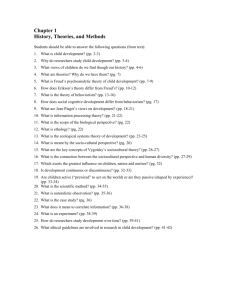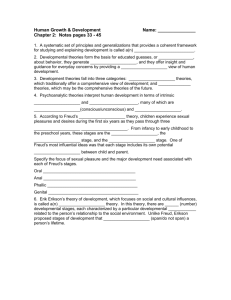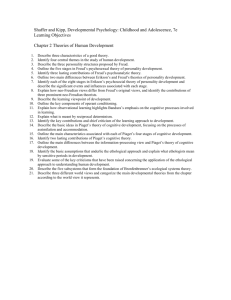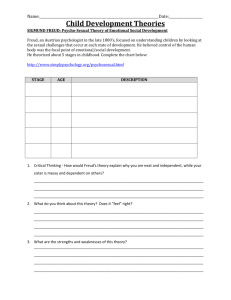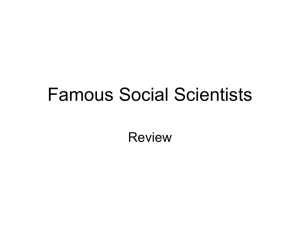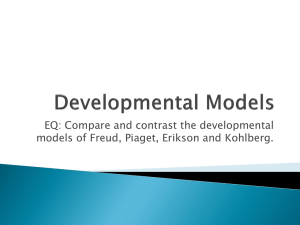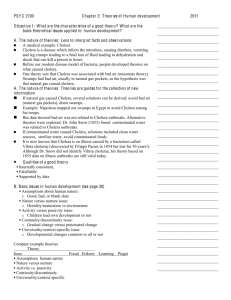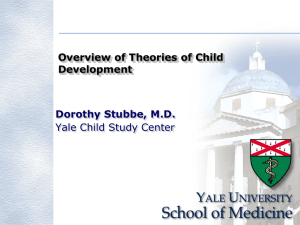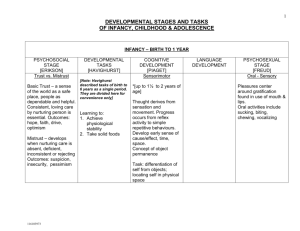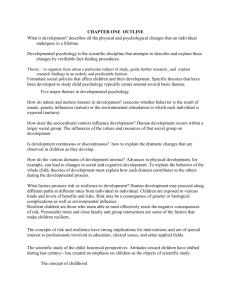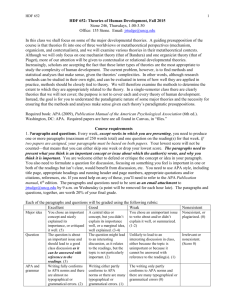freud contexts
advertisement
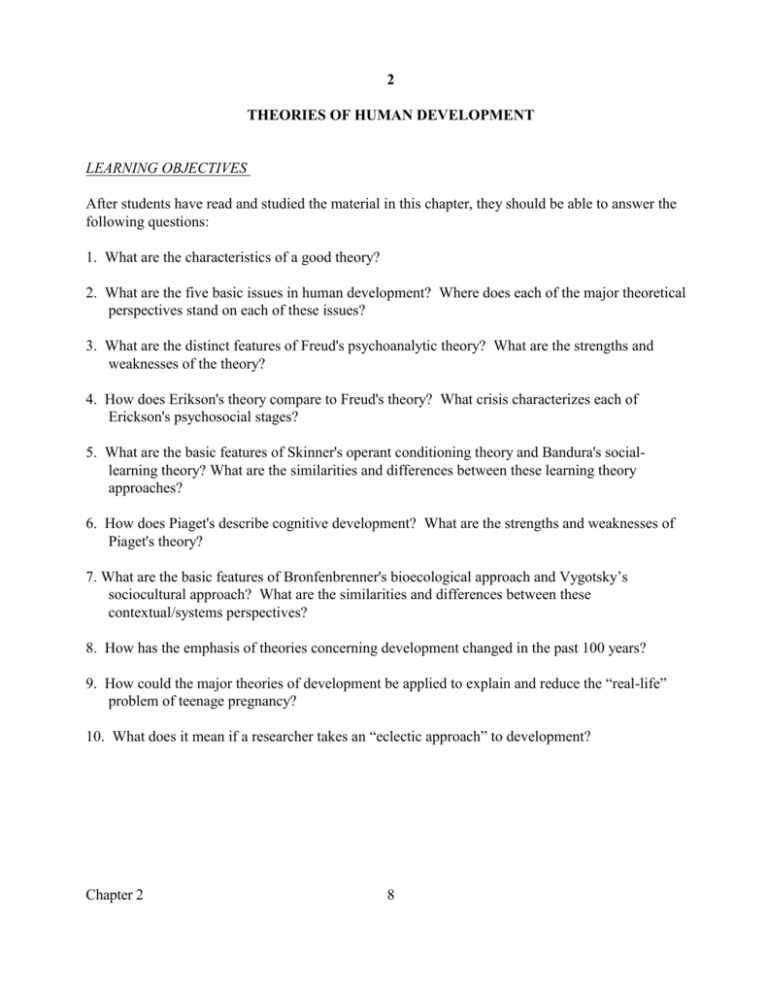
2 THEORIES OF HUMAN DEVELOPMENT LEARNING OBJECTIVES After students have read and studied the material in this chapter, they should be able to answer the following questions: 1. What are the characteristics of a good theory? 2. What are the five basic issues in human development? Where does each of the major theoretical perspectives stand on each of these issues? 3. What are the distinct features of Freud's psychoanalytic theory? What are the strengths and weaknesses of the theory? 4. How does Erikson's theory compare to Freud's theory? What crisis characterizes each of Erickson's psychosocial stages? 5. What are the basic features of Skinner's operant conditioning theory and Bandura's sociallearning theory? What are the similarities and differences between these learning theory approaches? 6. How does Piaget's describe cognitive development? What are the strengths and weaknesses of Piaget's theory? 7. What are the basic features of Bronfenbrenner's bioecological approach and Vygotsky’s sociocultural approach? What are the similarities and differences between these contextual/systems perspectives? 8. How has the emphasis of theories concerning development changed in the past 100 years? 9. How could the major theories of development be applied to explain and reduce the “real-life” problem of teenage pregnancy? 10. What does it mean if a researcher takes an “eclectic approach” to development? Chapter 2 8 CHAPTER OUTLINE I. The nature of theories A. The importance of theories 1. Lens for interpreting any number of facts and observations 2. Guides the collection of new information B. Qualities of a good theory 1. Internally consistent-- its different parts are not contradictory 2. Falsifiable-- generates testable hypotheses 3. Supported by data-- describes, predicts, and explains human development II. Basic issues in human development A. Assumptions about human nature 1. Hobbes-- society must control inherent selfishness and aggression 2. Rousseau-- society must not interfere with innate goodness 3. Locke-- child as tabula rasa “blank slate” B. Nature and nurture 1. Nature-- genetic/biological predisposition 2. Nurture-- emphasis on experience C. Activity and passivity 1. Activity-- control over one’s development 2. Nurture-- product of forces beyond one’s control D. Continuity and discontinuity 1. Continuity -- gradual change 2. Discontinuity-- abrupt change 3. Qualitative or quantitative change 4. Developmental stages part of discontinuity approach E. Universality and context-specificity 1. Universality-- developmental change common to everyone 2. Nurture-- developmental changes vary by individual/culture III. Freud: Psychoanalytic theory A. Instincts and unconscious motives 1. Instincts-- inborn biological forces that motivate behavior a. Life instincts-- life-sustaining activities b. Death instincts-- destructive forces 2. Unconscious motivation-- influences beyond our awareness/control B. Id, ego, and superego 1. Id a. all psychic energy contained here b. basic biological urges c. impulsive d. pleasure principle (seeks immediate gratification) 2. Ego a. rational side of personality 9 Chapter 2 b. reality principle (realistic way of gratifying instincts) c. balances between id and superego 3. Superego a. internalized moral standards b. perfection principle (adhere to moral standards) 4. Id, ego and superego conflict common/inevitable 5. Problems arise when level of psychic energy unevenly distributed C. Psychosexual development 1. Importance of libido-- sex instinct’s energy shifts body locations 2. Conflict of id and social demands leads to ego’s defense mechanisms a. fixation-- Development arrested at early stage b. regression-- Retreat to earlier stage 3. Five stages of psychosexual development a. oral stage b. anal stage c. phallic stage-- Oedipus and Electra complexes (incestuous desire) d. latency period e. genital stage E. Strengths and weaknesses 1. Difficult to test 2. Weak support for specific aspects of the theory 3. Greater support for broad ideas a. Unconscious motivation b. Importance of early experience, especially parenting IV. Erikson: Neo-Freudian psychoanalytic theory A. Neo-Freudians-- important disciples of psychoanalytic theory 1. Notable neo-Freudians: Jung, Horney, Sullivan, Anna Freud 2. Erikson is most important life span neo-Freudian theorist 3. Erikson’s differences with Freud a. Less emphasis on sexual and more on social influences b. Less emphasis on id, more on rational ego c. More positive view of human nature d. More emphasis on developmental changes in adulthood B. Psychosocial Development 1. Resolution of eight major psychosocial crises 2. Trust versus mistrust-- key is general responsiveness of caregiver 3. Autonomy versus shame-- terrible twos 4. Initiative versus guilt-- preschool sense of autonomy 5. Industry versus inferiority-- elementary age sense of mastery 6. Identity versus role confusion-- adolescence acquisition of identity 7. Intimacy versus isolation-- young adult commitment 8. Generativity versus stagnation-- middle age sense of having produced something meaningful 9. Integrity versus despair-- elderly sense of life meaning and success Chapter 2 10 10. Personality strengths “ego virtues” developed during stages 11. Stage development due to biological maturation and environmental demands C. Strengths and weaknesses 1. Its emphases on rational, adaptive nature and social influences easier to accept 2. Influenced thinking about adolescence and beyond 3. Like Freud, difficult to test 4. Provides description, but not adequate explanation of development V. Learning theories A. Watson: Classical Conditioning 1. Behaviorism-- belief that only observed behavior should be studied 2. Worked with colleague Rosalie Rayner a. Watson and Rayner classically condition infant “Albert” to fear rat b. Loud noise was unconditioned (unlearned) stimulus c. Crying (fear) was unconditioned (unlearned) response d. White rat became conditioned (learned) stimulus – producing conditioned response of crying—after it was paired with loud noise 3. Reject stage conceptualization of development B. Skinner: Operant Conditioning 1. In operant conditioning learning thought to become more or less probable depending on consequences 2. Reinforcement-- consequences that increase probability of future response 3. Punishment-- consequences that suppress future response 4. Positive-- something added 5. Negative-- something taken a. positive reinforcement—something pleasant added in attempt to strengthen behavior b. negative reinforcement—something unpleasant taken in attempt to strengthen behavior c. positive punishment—something unpleasant added in attempt to weaken behavior d. negative punishment—something pleasant taken in attempt to weaken behavior 6. Extinction-- no consequence given and behavior becomes less frequent 7. Skinner emphasized positive reinforcement 8. Physical punishment best used in specific circumstances like… a. administered immediately following act b. administered consistently following offense c. not overly harsh d. accompanied by explanation e. administered by otherwise affectionate person f. combined with efforts to reinforcement acceptable behaviors C. Bandura: Social Learning Theory 1. Humans’ cognitive abilities distinguish them from animals-- can think about 11 Chapter 2 behavior and anticipate consequences 2. Observational learning most important mechanism for behavior change 3. Classic experiment using “Bobo” doll showed that children could learn from model 4. Vicarious reinforcement-- learner changes behaviors based on consequences observed being given to a model 5. Reciprocal determinism-- mutual influence of individuals and social environments determines behavior D. Strengths and weaknesses of learning theory 1. Learning theories are precise and testable 2. Principles operate across the life span 3. Practical applications 4. Doesn't show that learning actually causes observed developmental changes 5. Oversimplifies development by focusing on experience and downplaying biological influences VI. Cognitive developmental theory Jean Piaget Swiss scholar greatly influences study of intellectual development in children 1. Emphasizes errors in thinking 2. Argues that cognitive development is qualitative in nature A. Piaget's Constructivism 1. Constructivism--active construction of knowledge 2. Stage progression due to interaction of biological maturation and environment B. Stages of cognitive development 1. Sensorimotor stage a. birth to age 2 b. deal with world directly through perceptions and actions c. unable to use symbols 2. Preoperational stage a. ages 2 to 7 b. capacity for symbolic thought c. lack tools of logical thought 3. Concrete operations stage a. ages 7 to 11 b. use trial-and-error strategy c. perform mental operations in their heads d. difficulty with abstract and hypothetical concepts 4. Formal operations stage a. ages 11 and later b. think abstractly and hypothetically c. can devise “grand theories” C. Strengths and weaknesses 1. Many of Piaget’s concepts accepted 2. Influential in education and child rearing practices 3. Too little emphasis on motivation and emotion Chapter 2 12 4. Questioning of stage model VII. Contextual and Systems Theories Changes over life span arise from ongoing transactions and mutual influences between organism and changing world Some theories arisen from psychobiology others focus on social context A. Vygotsky: A Sociocultural Perspective 1. Russian psychologist who took issue with Piaget 2. Sociocultural perspective-- development shaped by organism growing in culture 3. Cognitive development is social process 4. Children co-construct knowledge 5. Paid too little attention to biology B. Bronfenbrenner: The Bioecological Approach 1. Relationship between individual and environment is reciprocal 2. Bioecological approach-- emphasis on nature and nurture 3. Developing person embedded in interacting environmental systems a. microsystem-- immediate environment b. mesosystem-- interrelation ships between microsystems c. exosystem-- influential social setting not directly experienced d. macrosystem-- larger, subcultural or cultural contexts 4. Strengths and weaknesses a. emphasizes some neglected concepts i. Development occurs in context ii. Environments are dynamic b. not yet a full-blown theory--- and may never be c. must develop theories for all subgroups (race, age) VIII. Theories in Perspective A. Stage Theorists: Freud, Erikson, Piaget 1. Development guided in universal direction 2. Humans need a supportive environment 3. Humans evolve through distinct stages B. Learning Theorists: Watson, Skinner, Bandura 1. Developmental pathways depend on environment 2. Deliberate steps needed to shape development C. Contextual and Systems Theorists: Vygotsky, Bronfenbrenner 1. Focus on dynamic relationship between person and environment 2. Humans are active in developmental process 3. Potential exists for qualitative and quantitative change 4. Developmental pathways depend on interplay of internal and external influences D. Changing world views 1. Our understanding of human development is ever-changing 2. Contextual theory prevalent today 3. Less extreme positions 4. More emphasis on “minitheories” 13 Chapter 2
